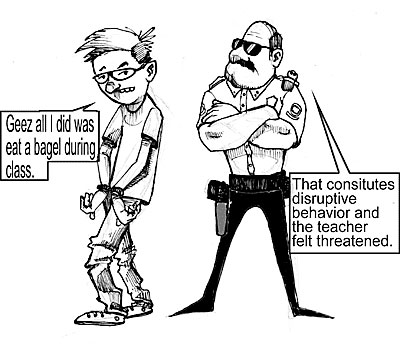
Illustration by Arnie Bermudez
|
|
By Sabrina Noble
Arizona Daily Wildcat
Thursday, November 13, 2003
According to the Dean of Students Office, "'Disruptive behavior' means conduct that materially and substantially interferes with or obstructs the teaching or learning process in the context of a classroom or educational setting."
That sounds reasonable, and the disruptive behavior policy passed by the faculty senate last week - based on faculty and student surveys - appropriately includes cell phone usage, arriving late to class or leaving early, eating, reading the newspaper and packing up early.
But if instructors care to use this new policy rigidly, they could call upon the police if students continue such types of disruptive behavior after being warned. Repeat offenders may be dropped.
Police? Administrative drops? For eating in class? I understand if a student is distributing barbequed chicken from a grill he or she has set up at the rear of the classroom, but this sounds a lot like the "Classroom Rules" posters that hang in elementary school rooms. These are professors' pet peeves, only now formally covered by university policy.
At least the faculty could admit to this. Instead, the senate passed the policy a mere week after the one-year anniversary of the College of Nursing shootings. Because of the policy's conspicuous timing, the faculty senate has implicitly drawn a relationship between disruptive behavior and classroom violence.
The Dean of Students Office has remarked that disruptive behavior is on a continuum of potentially threatening behavior. In doing so, the Dean and faculty have misrepresented the policy as a champion of classroom safety rather than conduct.
Now I don't know about you, but it's precisely when I don't get my morning coffee and bagel that I get edgy. Many students, severely pressed for time, bring their meals into the classroom. There's nothing like caffeine withdrawal to make things get out of hand.
This policy, if enforced (and what is its point if it isn't?), will only aggravate students, which is counterproductive if its goal is to lessen the risk of violence.
Besides, did Robert S. Flores Jr. exhibit warning signs for months in the form of packing up early? No, it was his threatening behavior toward faculty that was the problem, and this has everything to do with emotional instability - not with ordinary, disruptive behavior. That no one cared to report their concerns about him earlier is also part of the problem, and even in this past year's survey, 54.9 percent of students reported that their professors or TAs had not addressed disruptive behavior consistently.
Clearly, the responsibility for keeping classrooms safe does not lie entirely on students' shoulders. Disruptive behavior as outlined in the new policy is probably the very least of our concerns, but rather a faculty agenda to eliminate small irritations.
Yet the policy passed quietly beneath the shadow of a tragedy that is barely related. And students said not a word. After all, no one wants to criticize any new policy connected to the shootings for fear of stepping on toes.
Sounds a little like national politics lately.
Also interesting are the voices the policy left out, even as it pretended to recognize them: the students'.
In addition to 60 professors, over 700 students in Tier I and II general education courses completed similar surveys. While those students listed peers' disruptiveness, they also listed concerns with professors. Complaints included instances of professors making rude, off-topic or condescending remarks. The majority of surveyed professors listed student tardiness, but students cited instructors arriving late to class as equally disruptive.
One would think these students' comments merit further investigation. Whether real or perceived, a rude or careless professor is more likely to anger students than is a peer reading the newspaper, as seen by Flores' own disturbing words. We can never know how he truly interacted with his professors, but to unstable minds perception can be as good as truth. By no means should professors walk on glass, but if rude and condescending remarks are being made - and they are - something must be done. Such behavior, especially from those who should realize the sensitivity and consideration their roles demand, is simply unacceptable.
The faculty is right to be concerned about student behavior, but professors must also demand accountability amongst themselves. Instructors are both blessed and cursed with the ability to influence their students; they must be alert to how that power is both used and abused. While the disruptive behavior policy is a good - if perhaps trivial - starting point, it fails to address the larger issues: why classroom violence occurs and the necessity for a joint effort for change between students and professors.
Sabrina Noble is an English and creative writing senior. She can be reached at letters@wildcat.arizona.edu.
